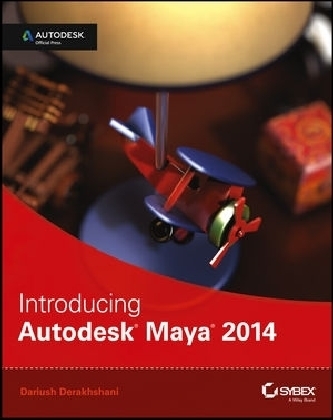
Introducing Autodesk Maya 2014
John Wiley & Sons Inc (Verlag)
978-1-118-57490-4 (ISBN)
- Titel ist leider vergriffen;
keine Neuauflage - Artikel merken
Autodesk Maya is the industry–leading 3D animation and effects software, and this detailed Autodesk Official Press book is the ideal way to get you started using Maya like a studio veteran. Professional visual effects artist and Maya expert Dariush Derakhshani clearly explains the basics of modeling, texturing, animating and visual effects for new users, while leading you through fun and challenging lessons that give you plenty of hands–on practice. The book includes a color insert featuring dazzling examples from talented beginners, so you can see what′s possible.
Gets beginners and those migrating from other 3D applications up and running on Autodesk Maya 2014
Helps users master the Maya interface and the basics of modeling, texturing, animating, and visual effects
Provides practical and fun, step–by–step tutorials that illustrate realistic, professional challenges
Includes a full–color insert of amazing examples from talented beginners
Written by an Autodesk Authorized Author and is an Autodesk Official Press book
Whether you′re new to 3D or migrating from another 3D application, Introducing Autodesk Maya will kickstart your creativity and get you up and running on Maya.
Dariush Derakhshani is an award–winning visual effects supervisor, author, and educator. He has worked on movies such as The Fantastic Four and Pan′s Labyrinth, the South Park TV series, and countless commercials and music videos. He teaches Maya and 3D animation, and is the author all the Introducing Maya books, as well as coauthor of Autodesk 3ds Max 2012 Essentials and Autodesk 3ds Max 2013 Essentials. Dariush is also an Autodesk Certified Instructor (ACI) and Autodesk Certification Evaluator (ACE).
Introduction xvii
Chapter 1 Introduction to Computer Graphics and 3D 1
Art? 2
Computer Graphics 2
Th e Stages of Production 4
Th e CG Production Workflow 8
Core Concepts 10
Basic Film Concepts 21
Summary 26
Chapter 2 Jumping in Headfirst, with Both Feet 27
You Put the U in UI 28
Project Overview: Th e Solar System 33
The Preproduction Process: Planning 33
Creating a Project 34
The Production Process: Creating and Animating the Objects 36
Hierarchy and Maya Object Structure 51
The Solar System, Resumed 53
Outputting Your Work: Playblasting 61
Summary 63
Chapter 3 The Autodesk Maya 2014 Interface 65
Navigating in Maya 66
Exploring the Maya Layout 66
Building a Decorative Box 82
Mapping the Box’s Reference Planes with Hypershade 85
Organizing Workflow with the Layer Editor 90
Modeling the Decorative Box 91
Editing the Decorative Box Model Using the Shelf 96
Continuing the Decorative Box Model 102
Finishing the Decorative Box Model 105
Summary 113
Chapter 4 Beginning Polygonal Modeling 115
Planning Your Model 116
Polygon Basics 119
Poly Editing Tools 121
Putting the Tools to Use: Making a Simple Hand 130
Creating Areas of Detail on a Poly Mesh 136
Modeling a Catapult 148
Suggestions for Modeling Polygons 170
Summary 170
Chapter 5 Modeling with NURBS Surfaces and Deformers 171
NURBS! NURBS! 172
Using NURBS Surfacing to Create Polygons 184
Converting a NURBS Model to Polygons 186
Editing NURBS Surfaces 187
Patch Modeling: A Locomotive Detail 189
Using Artisan to Sculpt NURBS 201
Modeling with Simple Deformers 203
The Lattice Deformer 207
Animating Through a Lattice 211
Summary 214
Chapter 6 Practical Experience 215
Evaluating the Table Lamp 216
Modeling the Base 217
Creating the Lamp Stem 219
Modeling the Lampshade 231
Making the Toy Airplane 236
Using Maya File References 263
Finishing the Toy Airplane 265
Updating the File Reference 268
Summary 269
Chapter 7 Autodesk Maya Shading and Texturing 271
Maya Shading 272
Shader Types 272
Shader Attributes 276
Shading and Texturing the Table Lamp 280
Textures and Surfaces 286
Textures and UVs for the Red Wagon 293
Photo–Real Mapping: Th e Decorative Box 327
For Further Study 344
Summary 344
Chapter 8 Introduction to Animation 345
Keyframe Animation: Bouncing a Ball 346
Throwing an Axe 357
Replacing an Object 374
Animating Flying Text 375
Rigging the Locomotive, Part 1 380
Animating the Catapult 383
Summary 388
Chapter 9 More Animation! 391
Skeletons and Kinematics 392
Skeletons: The Hand 410
Inverse Kinematics 425
Basic Relationships: Constraints 430
Basic Relationships: Set–Driven Keys 435
Application: Rigging the Locomotive 438
Creating a Simple Character Rig 445
For Further Study 454
Summary 455
Chapter 10 Autodesk Maya Lighting 457
Basic Lighting Concepts 458
Maya Lights 463
Light Linking 469
Adding Shadows 471
Raytracing Soft Shadows 475
Mental ray Lighting 477
Mental ray Physical Sun and Sky 479
Lighting Effects 484
Lighting the Table Lamp and Decorative Box 488
Further Lighting Practice 494
Tips for Using and Animating Lights 495
Summary 497
Chapter 11 Autodesk Maya Rendering 499
Rendering Setup 500
Previewing Your Render: The Render View Window 509
Reflections and Refractions 511
Using Cameras 513
Motion Blur 520
Batch Rendering 521
Rendering the Wine Bottle 522
Mental ray for Maya 525
Render Layers 531
Final Gather 540
Ambient Occlusion 543
HDRI 551
Displacement Mapping the Decorative Box 553
Rendering the Lamp and Decorative Box 561
Summary 571
Chapter 12 Autodesk Maya Dynamics and Effects 573
An Overview of Dynamics and Maya Nucleus 574
Rigid and Soft Dynamic Bodies 574
Animating with Dynamics: The Pool Table 578
Fun Dynamics: Shoot the Catapult! 587
nParticle Dynamics 590
Emitting nParticles 590
Animating a Particle Effect: Locomotive Steam 596
Introduction to Paint Effects 602
Toon Shading 606
Getting Started with nCloth 609
Customizing Maya 614
Summary 617
Where Do You Go from Here? 618
Index 619
| Verlagsort | New York |
|---|---|
| Sprache | englisch |
| Maße | 187 x 231 mm |
| Gewicht | 1316 g |
| Themenwelt | Informatik ► Grafik / Design ► Maya |
| Informatik ► Office Programme ► Outlook | |
| ISBN-10 | 1-118-57490-7 / 1118574907 |
| ISBN-13 | 978-1-118-57490-4 / 9781118574904 |
| Zustand | Neuware |
| Haben Sie eine Frage zum Produkt? |